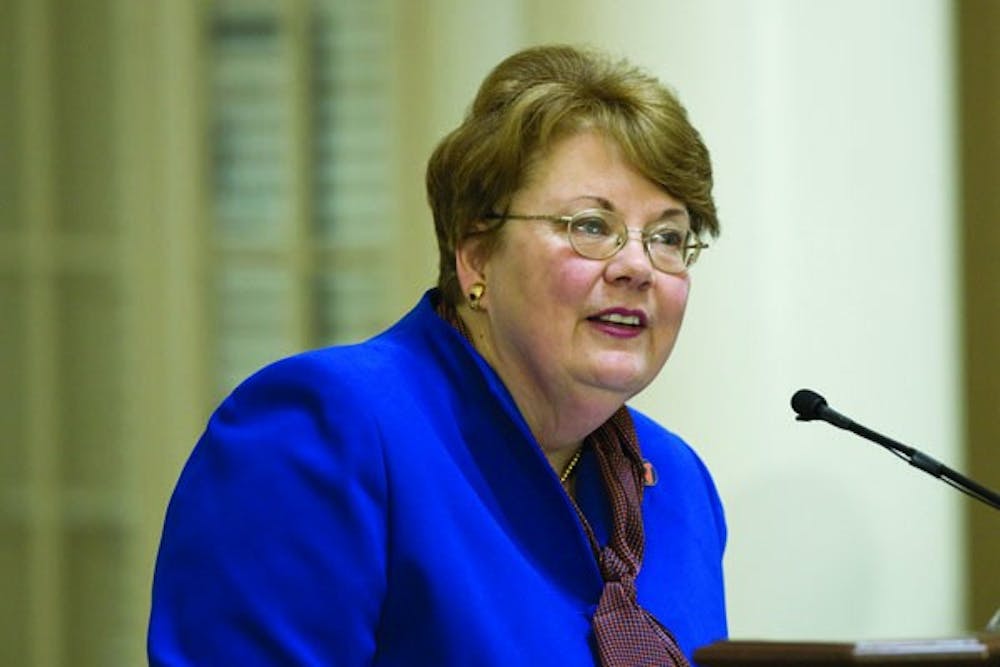University President Teresa Sullivan announced the formation of an ad hoc committee on public safety Monday. The committee, formally titled the Ad Hoc Group on University Climate and Culture, is chaired by Sullivan and includes two members of the Board of Visitors, two faculty, four students, one staff member, one dean and four alumni and parent representatives.
Sullivan said in a press release the committee would have a broad mandate to review how the University can leverage existing resources to create a culture of student safety. Sullivan convened the committee to help the University respond to a recent article in Rolling Stone magazine alleging a gang rape at a fraternity house.
The press release outlined three areas on which the committee will focus: Culture, including student behavior, Greek life, alcohol and other drug use; Prevention, including bystander training and peer education, lighting, camera systems and policing; and Response, including institutional survivor support, training for students and faculty, and adjudication policies.
"There was a lot of discussion
about creating policy and infrastructure
changes to reshape culture.”
Arts & Sciences Graduate student Eric McDaniel, a committee member and former Student Council president, said at its inaugural meeting Friday, the committee discussed ways to change the culture around sexual assault through University policy.
“I think it was looking as pragmatically as possible at ‘what are the larger cultural issues at the University?’ and narrowing that focus into ‘how do those manifest?’" McDaniel said. "There was a lot of discussion about creating policy and infrastructure changes to reshape the culture."
McDaniel said Pat Hogan, the executive vice president and chief operating officer, reviewed the current initiatives the University had underway to improve safety.
“Safety and policy reform is something the University has been working on since [at least] July, when they started looking at the Not on Our Grounds and Hoos Got Your Back campaigns, and have carried that through after Hannah [Graham's] disappearance, [and] since the [Rolling Stone] article came out,” McDaniel said. “Because of how long they’ve been working on these short-term fixes, I think they are going to be more substantial than one might initially expect.”
"There's lots of ways that this can
be done, and there's lots of people
who have been doing good work
around this already.”
Music Department Prof. Bonnie Gordon, also a committee member, said the University must make large changes to its culture around sexual assault, power and privilege.
“We have a long history of problems around power and privilege involving gender and race that need to be addressed,” Gordon said. “There’s lots of ways that this can be done, and there’s lots of people who have been doing good work on this already.”
In the near term, the committee will work with the Inter-Fraternity Council on revising Fraternal Organization Agreements, or FOAs, and amending the rush process. The IFC submitted recommendations to the Board of Visitors Nov. 25, and Sullivan said she expects to arrive at a final list of changes by the end of the calendar year.
The IFC said it will not comment to the media before agreeing on new member initiation and FOA changes with University administrators.
In a separate statement released Monday, Sullivan defended her decision to suspend all fraternity and sorority FOAs, effectively halting activity in the University’s Greek community through Jan. 9. The suspension will continue, despite emerging questions about the accuracy of the Rolling Stone article.
“The purpose of the suspension of fraternity and sorority social activities was to give the University and Greek leadership a pause to identify solutions that would best ensure the well-being and safety of students,” the second statement said. “This important collaborative work continues, and the reinstatement of Greek activities on Jan. 9 will be in conjunction with a new Fraternal Organization Agreement that will enhance the safety of members and their guests.”
The second statement came after the Fraternity and Sorority Political Action Committee, the National Panhellenic Conference and the North American Fraternity Conference released a statement Sunday calling for the University to lift its suspension.
“This decision was made before an investigation into all of the facts alleged in the story was completed and it was not consistent with the law or university policies,” the national groups’ statement read. “The school’s decision to suspend hurt the reputation of thousands of outstanding student leaders in our organizations who had nothing to do with the alleged events described in the article.”
Gordon said new information about the accuracy of the Rolling Stone article would not affect the committee’s work.
“I think that people are pretty aware that regardless of the bad reporting of the article, that there’s a problem here — like at many universities — and most people involved understand that and probably understood it before the article came out,” Gordon said.
Other student members include fourth-year College student Julia Pedrick, president of the Inter-Sorority Council, fourth-year College student Ashley Brown, chair of the sexual assault advocacy group One Less and fourth-year Commerce student Brian Head, the president of the all-male sexual assault peer education group One in Four and a member of Phi Gamma Delta fraternity.
Sullivan also named Board of Visitors members Frank Conner (CLAS ‘78, LAW ‘81) and Allison Cryor DiNardo (CLAS ‘82); Architecture School Dean Beth Meyer; student affairs staff member Margaret Grundy; parent representative Paul Hobby; Sociology Prof. Rae Blumberg, a specialist in gender stratification; Alex Arriaga (CLAS ‘87) a former women’s rights adviser; Elisa Holquist (CLAS ‘85), a former managing director at JPMorgan and Mead Endowment advisory board member; and Jodie Berndt (CLAS ‘85), a Parents’ Committee co-chair and member of a sorority while at the University, to the committee.





